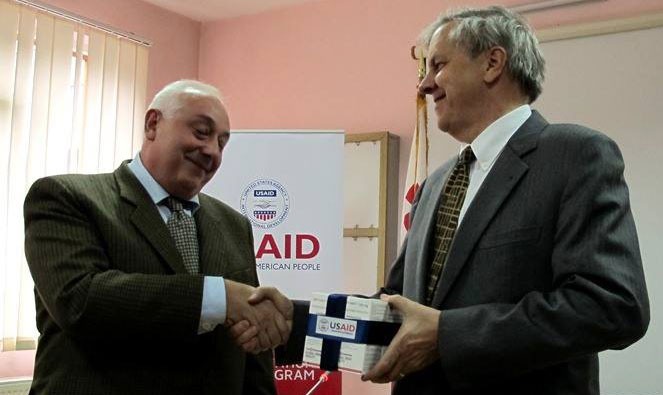- What We Do
- Agriculture and Food Security
- Democracy, Human Rights and Governance
- Economic Growth and Trade
- Education
- Ending Extreme Poverty
- Environment and Global Climate Change
- Gender Equality and Women's Empowerment
- Global Health
- Water and Sanitation
- Working in Crises and Conflict
- U.S. Global Development Lab

Georgia becomes first recipient of free treatment through an innovative drug donation partnership between USAID and Janssen Therapeutics, a pharmaceutical company of Johnson & Johnson
Patients in Georgia suffering from deadly strains of multidrug-resistant tuberculosis (MDR-TB) will soon have access to potentially life-saving medication thanks to a collaboration between the U.S. Agency for International Development (USAID) and Janssen. Nearly 200 patients in Georgia will begin receiving the tuberculosis drug, SIRTURO® (bedaquiline), as part of their treatment program for MDR-TB. Georgia is classified as a high MDR-TB burden country with 39.2% among retreatment cases and 11.6% among new cases being identified as multidrug-resistant.
MDR-TB is a form of TB that is resistant to at least two of the four most commonly used anti-TB medicines in today’s standard treatment regimen. The public-private partnership between USAID and Janssen aims to fight the global health threat of antibiotic-resistant bacteria, particularly that seen in MDR-TB, and will enable responsible introduction of bedaquiline in more than 100 low- and middle-income Global Fund to Fight AIDS, Tuberculosis and Malaria-eligible countries worldwide, including Georgia.
“This partnership between USAID and Janssen is a significant step forward in the global fight against the threat of MDR-TB,” said U.S. Ambassador to Georgia, Ian Kelly, speaking at an event in Tbilisi, Georgia, October 13, to mark the launch of the bedaquiline donation program in the country. “I am confident that this will be a public-private partnership in which we can all be proud. By acting together to combat TB now, we can reduce the potential of drug-resistant TB in the future,” he said.
In Georgia, USAID-funded programs focus on improving early detection of TB, strengthening TB and MDR-TB control through technical assistance and capacity building, and supporting research and innovation. This donation program will effectively embed the introduction of bedaquiline into existing TB-focused USAID programs and services in Georgia.
“We are partnering to make a lasting difference in human health,” said Ross Underwood, Global Access Leader, Janssen. “We are committed to providing access to a treatment against MDR-TB in a part of the world with an extremely high burden of disease, bringing us closer to our mutual goal of achieving global public health for individuals, families, and communities.”
Through the agreement between Janssen and USAID, Janssen will contribute an estimated 30,000 courses of treatment. USAID will work with implementing partners, national TB programs, and Janssen to ensure responsible access and appropriate use of the drug in accordance with the World Health Organization guidelines [PDF, 531KB].
The donation will be provided through USAID’s agreement with the Stop TB Partnership’s Global Drug Facility (GDF) to facilitate access to quality-assured medicines. To date, 28 countries have reached out to GDF to receive bedaquiline through the donation program.
Learn More:







Comment
Make a general inquiry or suggest an improvement.